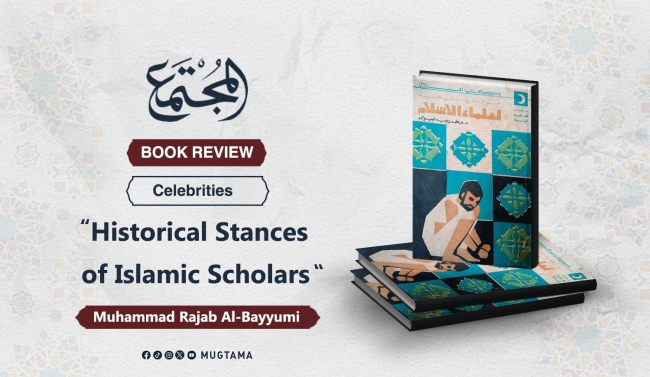Book Review “Historical Stances of Islamic Scholars” by Muḥammad Rajab Al-Bayyumi
The book “Historical Stances of Islamic Scholars,” published in 1984, provides a glimpse into the historical positions taken by Islamic scholars, particularly the scholars of Al-Azhar, who presented rare examples of esteemed scholars speaking the truth in the face of authority without being swayed by positions or wealth, nor intimidated by rulers or presidents.
The author of the book, Dr. Muḥammad Rajab Al-Bayyumi, former Dean of the Faculty of Arabic Language in Mansoura, highlights numerous instances where Al-Azhar figures defended the truth and stood against falsehood. He calls for the documentation and preservation of these enduring stances, emphasizing the importance of recognizing the same Quranic spirit that inspired figures like Saeed bin Jubair, Saeed bin Al-Musayyib, Ahmad ibn Hanbal, and Al-Izz ibn Abd al-Salam, which also influenced the scholars of Al-Azhar who confronted falsehood with clear and honest speech.
The valuable book, consisting of 235 pages, discusses the actions of the esteemed Egyptian scholar Sheikh Muhammad Abu Zahra (1898-1974). When invited to a major Islamic symposium in one of the Arab capitals, the symposium was inaugurated by the head of state who declared that socialism was the Islamic doctrine. None of the attendees responded, but Abu Zahra courageously took the floor and said: We, the scholars and jurists of Islam, have come to this symposium to speak the word of Islam as we see it, not as politicians see it. It is the duty of politicians to listen to scholars and understand that they are knowledgeable and not easily deceived by superficial appearances. Having studied what is called socialism, we find that Islam is of higher value and greater direction than to be confined within its scope. The participants will express their opinions as they believe, not as politicians want, for they are the ones with authority in this field.
Al-Bayyumi comments in his rich and instructive book that the symposium, initially scheduled for a full week, concluded with its opening session due to Abu Zahra's decisive and rare historical stance.
The late Sheikh of Al-Azhar, Sheikh Muhammad Mustafa Al-Maraghi (1881-1945), is also featured as one of the prominent figures in “Historical Stances of Islamic Scholars.” He is remembered for his bold stand during his tenure as a judge when King Farouk divorced his wife Queen Farida and wanted to forbid her from remarrying. Al-Maraghi refused to issue such a fatwa. When the king visited him in the hospital, Al-Maraghi famously said, “As for the divorce, I do not approve of it, and as for the prohibition, I do not have the authority for it.” When the king pressed further, the sheikh declared, “Al-Maraghi cannot forbid what Allah has made lawful.”
Another historical stance documented in the book involves the late Sheikh of Al-Azhar, Abdel Meguid Selim (1882-1954), who, when serving as Mufti of Egypt, received a question from a magazine opposed to the king about the legality of hosting dancing parties in palaces. One of the fatwa office officials noted that the king had held such a party at Abdeen Palace, making the question politically charged, as the magazine wanted to drive wedge between the Sheikh and the king. Nevertheless, Sheikh Selim responded that the Mufti must answer questions truthfully and issued a fatwa prohibiting these parties.
The book also highlights the positions of the late Sheikh of Al-Azhar, Sheikh Gad al-Haq Ali Gad al-Haq (1917-1996), who was the first to declare that the genocide in Bosnia and Herzegovina was a crusade aimed at eradicating Muslims. He was the first to call for an Islamic conference at Al-Azhar Mosque to support the Bosnian Muslims, emphasizing that they don’t need mujahideen as much as they needed money and weapons.
When the US Congress decided to move the American embassy to Jerusalem, Sheikh Gad al-Haq issued a clear and strong statement condemning the continuous Zionist aggression on Jerusalem and the US decision, considering it support for the unjust aggressors. He rejected normalization with Israel, stating that there can be no peace with the usurping Jews and that peace would only come with the liberation of Arab lands. He also opposed Muslim visits to Jerusalem following some scholars' fatwa allowing it after the Oslo Accords in 1993. Regarding the Egyptian prisoners killed by Israel on purpose during the June 1967 war, he asserted that deliberate killing deserved retribution.
The late Imam also had a notable stance against the 1994 International Conference on Population and Development held in Cairo. He fiercely opposed some of the conference's provisions and issued a strong statement rejecting its document, reaffirming that Islam does not condone any sexual relations outside of lawful marriage, prohibits adultery, homosexuality and abortion, even in cases of adultery. He urged the Islamic Ummah to disregard any clause or paragraph that contradicted Islamic Sharia.
-------------------------------------------------------------

